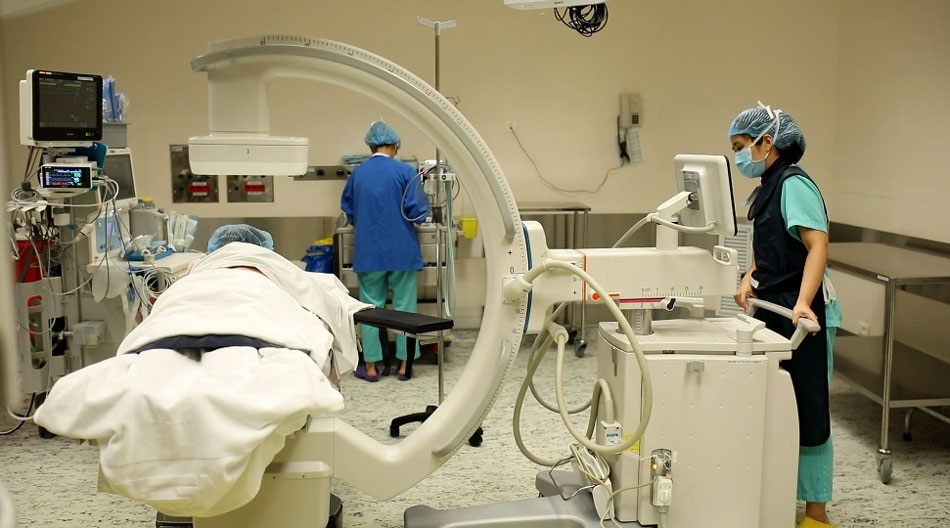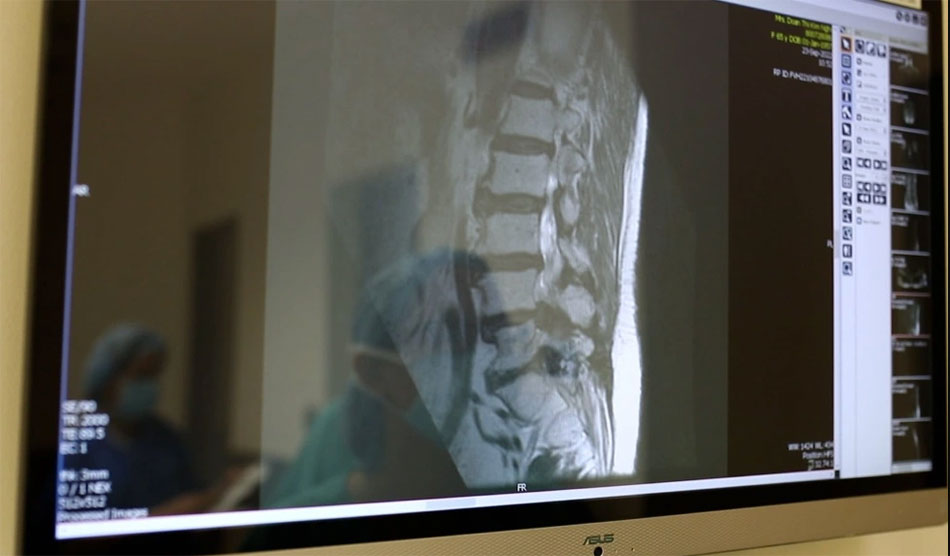FV Hospital’s Pain Clinic can apply a nerve block to treat shoulder pain, knee joint pain, spondylolisthesis, disc herniation, postherpetic shingles pain and trigeminal neuralgia, among other conditions.
A declining quality of life due to persistent pain
During a business trip to Hanoi in 2020, Mr Phan Thanh Tan (HCMC) suffered an accident and had to be treated at a large hospital in the capital. Imaging results showed that he had damage to two vertebrae at the end of the lumbar region and the fibrous capsule of a herniated disc had torn, compressing the nerve root. Mr Tan had to be treated in Hanoi for one month.

Staff prepare the Operation Theatre before a nerve block procedure at FV Hospital
Returning to Ho Chi Minh City, Mr Tan’s mobility was limited and he often suffered from terrible pain that forced him to sit to one side. Due to the side effects of continuous use of pain relievers and anti-inflammatory drugs on his stomach, liver and kidneys, Mr Tan’s health began to drastically deteriorate.
Mr Tan visited FV Hospital for examination and pain treatment consultation at FV’s Pain Clinic. Here, he was appointed by Dr Louis Brasseur and Dr Nguyen Nam Binh to receive an epidural injection – a nerve blocking procedure to alleviate pain, also known as a nerve block.
“After a week, I felt completely normal if I sat or walked with a correct posture. Now, more than a year later, I am continuing physical therapy but I can do normal activities like swimming and walking. I can walk three kilometres without pain and I no longer need pain medication,” says Mr Tan.
Ms Hoa (the patient’s name has been changed to protect their identity) also suffered from back pain for a long time due to a herniated disc. She was treated in many places but her condition did not improve. The pain even spread to Ms Hoa’s legs, making her limp, and she had to pause while walking often because it was too painful to continue. Doing business and traveling was difficult and adversely affected Ms Hoa’s ability to work, making her feel stressed.
Dr Nguyen Nam Binh recalls that on the day he examined Ms Hoa, she cried due to pain and psychological suffering. Dr Nam Binh knew he must treat Ms Hoa for both her physical pain and mental health. One week after receiving an epidural injection, Ms Hoa still felt some discomfort, which then disappeared completely. More than a year later, her pain had not returned and Ms Hoa brought her mother who also had pain due to herniated disc to see Dr Binh for a nerve block.
“In theory, epidural permeation should only be effective for a few months. But I treated these cases more than a year ago and the patients’ pain has not returned. That shows a hugely positive effect on a patient’s quality of life due to this pain relief method. A nerve block combined with other non-drug therapies such as physiotherapy and oriental medicine can be hugely beneficial for patients,” Dr Nam Binh notes.
A nerve block is a technique that affects nerves, including peripheral and central nerves, to block the transmission of pain signals sent to the brain to achieve immediate, effective, prolonged pain relief. The active ingredients used for the block are long-acting local anaesthetics and steroidal anti-inflammatory drugs.

Nerve blocks helps effectively control chronic pain, especially that related to osteoarthritis and spine disease.
This technique is also often applied in the treatment of pain related to bones and joints such as shoulder pain, knee joint pain, spondylolisthesis, or nerve pain such as postherpetic shingles pain and trigeminal neuralgia. Some patients experience pain in the incision or near the incision after a surgery because the nerve is “trapped” in the incision or nearby structures such as the ligaments and muscles, causing the patient to experience numbness or stinging and burning sensations. A nerve block can also be indicated in that location to relieve pain.
Another common application is an occipital nerve block to treat tension headaches and migraines, or in cancer pain treatment. For pain that is difficult to treat with morphine, the doctor will block the patient’s nerves by burning the nerve ganglia causing the pain. This technique is very advanced and is performed in the operating room with a high degree of safety.
“In many cases, a nerve block is a treatment that is extremely efficacious for long-lasting pain relief, especially for patients who cannot have surgery because of cardiovascular disease, advanced age, who do not want to use pain medication regularly or are afraid of the side effects of pain relievers. However, it is still important to emphasise that in chronic pain treatment, the combination of multiple therapies and multidisciplinary cooperation is extremely important,” adds Dr Nam Binh.

Dr Nguyen Nam Binh, Pain Clinic, FV Hospital, advises patients
At FV, the nerve block procedure is performed by doctors who have trained abroad and specialise in pain treatment under the guidance of the Head of FV’s Pain Clinic Dr Louis Brasseur, an international expert who has decades of experience in this field. Procedures are carried out in sterile operating rooms which meet JCI medical standards – one of the world’s most prestigious medical standards.
Nerve block manipulation is performed under the guidance of ultrasound machines or more advanced machines and equipment such as curved X-ray machine (C-arm) and CT-scan. Advanced machines help to accurately determine the location of the nerve to be blocked, avoiding complications when administering drugs as well as risk of bleeding or severed nerves.
Not all cases are indicated for a nerve block. Based on a comprehensive multifaceted clinical assessment, patient history, stage of disease and imaging results, physicians will decide whether to use a nerve block to support rapid, acute treatment of pain or to administer drugs or other therapies instead.
Please contact the FV Hospital hotline on (028) 35 11 33 33 for examination and treatment of chronic pain by nerve block methods.



